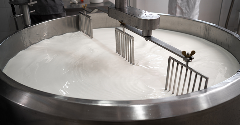News
Nestlé remains largest dairy company
27 Jul 2016The Rabobank Global Dairy Top 20 2016, the latest annual Rabobank survey of the world’s largest dairy companies, shows that Nestlé remains the largest with a turnover of $25 billion.

The Rabobank Global Dairy Top 20 2016, the latest annual Rabobank survey of the world’s largest dairy companies highlights the giants of one of the world’s most valuable food sectors.
Nestlé remains the largest with a turnover of $25 billion, and the second and third places remain unchanged, occupied by Lactalis ($18.3bn) and Danone ($16.7bn). Dairy Farmers of America ($13.8bn) has overtaken Fonterra ($13.1bn) in fourth place. 2015 proved to be a difficult year for most, Rabobank said, with the strong US dollar and currency volatility, together with low commodity prices, reducing turnovers for most companies. Mergers and acquisitions continued apace, as companies continued to seek additional value from domestic markets and new opportunities elsewhere. “The big story in this year’s top 20 list of dairy companies—based on turnover—is the shrinkage of the overall size of the pie,” said Rabobank’s Global Dairy Strategist Kevin Bellamy. “Low dairy commodity prices and currency movements have had a dramatic downward effect on company sales values.” In US dollar terms, the top 20 posted combined dairy sales of USD 194bn in 2015, down 13% YOY. It is indicative of how much the euro has weakened against the US dollar in 2015 that the same collective turnover of the top 20 improved 4% YOY in euro terms.” “As growth in China slowed, the world’s largest dairy companies started to look for new horizons to develop. Africa is now definitely on the dairy map. In total, there were 14 deals in Africa, with four more year-to-date in 2016. This compares with only three deals recorded in Africa in the whole of 2014.”Related news

Consumers dislike faba beans’ sensory profile
3 Jun 2024
Consumers display low acceptance of faba beans, with sensory properties such as bitterness a core concern, a study suggests. However, for product varieties such as cocoa-free chocolate, this attribute could prove to be a benefit.
Read more
Food scientists uncover new way to preserve nutrient and flavour quality
29 May 2024
Researchers have developed a method that guarantees food safety for low-moisture products, such as dried milk, while maximising quality by retaining vitamins, minerals, and flavours, they say.
Read more
FDA scrutinizes milk pasteurisation over HPAI risk
28 May 2024
The US Food and Drug Administration (FDA) is undertaking additional scientific research work to ensure that approved pasteurization processes are rigorous enough after retailer milk tests showed contamination from Highly Pathogenic Avian Influenza (HPA...
Read more
Magnum targets ice cream lovers’ moods with new flavours
2 May 2024
Unilever-owned Magnum has released a suite of “mood-inspired flavours” as the 2024 ice cream season kicks off. The offerings, marketed as the Magnum Pleasure Express, are Magnum's first foray into the “mood-food” category.
Read more
The eight global food trends shaping the future of dining
23 Apr 2024
Unilever’s Future Menu Trend 2024 report identifies the global food trends shaping the food service industry, providing insights into changing consumer preferences that could provide inspiration for packaged food and drink brands.
Read more
Report outlines how the US interfered with marketing restrictions on formula across the globe
18 Apr 2024
A recent investigative report by ProPublica unmasked the extensive interference by the US government in international regulations concerning the marketing of formula.
Read more
Ultra-processed food intake in South Africa at concerning levels, study suggests
19 Mar 2024
As South Africa considers introducing front-of-pack warning labels and strict marketing limits for unhealthy foods, research has found that low-income South Africans get around half of their calories from ultra-processed foods (UPFs) – “a cause for con...
Read more
India’s mithai market develops new ingredient and flavour profiles
18 Mar 2024
Mithai is a hugely popular dessert and sweet snack in India and manufacturers are experimenting with unique ingredients, new flavour combinations, and healthier versions to capture new audiences.
Read more
Unilever and Perfect Day’s animal-free dairy dessert: Is precision fermentation the future of dairy?
6 Mar 2024
Perfect Day, a precision fermentation dairy supplier, has partnered with Unilever's Breyers, a brand of ice cream and frozen dairy desserts, to launch Breyers lactose-free chocolate frozen dessert.
Read more
Macauba oil emerges as potential rainforest-friendly palm oil alternative
1 Mar 2024
Producers and researchers consider the rainforest-friendly credentials of Macauba palm oil and whether its sustainability credentials offer an opportunity to replace palm oil.
Read more